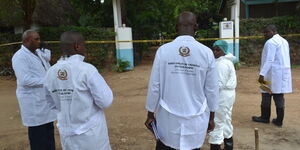The Kenya Wildlife Service (KWS) has proposed new park entry fees for citizens, residents, and foreign tourists in an effort to raise revenue for conservation, marking the first adjustment in 18 years.
The draft Wildlife Conservation and Management (Access and Conservation) (Fees) Regulations, 2025, outline the revised charges for entry into national parks, reserves, sanctuaries, and marine parks across the country.
The proposed fees will vary between high season (July to March) and low season (April to June), with different rates for citizens, residents, and non-residents. The adjustments will apply to popular destinations such as Nairobi National Park, Amboseli, Tsavo East, Tsavo West, Mount Kenya National Park, and marine parks including Malindi and Kisite Mpunguti.
The proposal calls for a 74.4 per cent increase in admission fees for adult residents and other East African Community (EAC) nationals to the nation's two premium parks, Amboseli National Park and Lake Nakuru National Park, from the current rate of Ksh860 to Ksh1,500.
The charges for Tsavo East and Tsavo West parks will rise from KSh 515 to KSh 1,000, while entry to Nairobi National Park will see adult citizens pay Ksh1,000 in the high season and Ksh600 in the low season. Non-resident adults will pay Ksh7,500 during the high season and Ksh5,000 in the low season.
Meru National Park, Kora National Park, and Aberdare National Park will charge locals Ksh800, while foreign tourists will pay between Ksh9,046.10 and Ksh5,169.
Tourists visiting Hell's Gate, Mt. Longonot, and Lake Elementaita Wildlife Sanctuary will pay Ksh500 or while foreign visitors will pay between Ksh6,461 and Ksh2,584.
The proposal also introduces a new pricing bracket for children aged between five and 17 years, with revised rates across all parks. Seniors aged 70 and above, as well as persons with disabilities, will be exempt from paying entry fees.
To promote affordability for frequent visitors, annual passes will be introduced. An adult pass will cost Ksh45,000, a child’s pass Ksh10,400, a family pass for two adults and up to five children Ksh130,000, and a tour driver’s pass Ksh6,000.
Discounted rates are also proposed for conferences, professional delegations, and educational groups. The draft regulations introduce new charges for water sports activities and higher daily rates for vehicles, motorcycles, aircraft, helicopters, boats, and drones in public parks.
KWS says the changes are intended to address rising operational costs, inflation, and the need for sustainable funding for wildlife conservation. Despite significant increases in the cost of maintaining parks, entry fees have remained unchanged since 2006.
The proposal also seeks to align Kenya’s park fees with global standards. KWS notes that countries such as Tanzania and South Africa have already reviewed their charges to support the costs of preserving wildlife habitats and enhancing visitor experiences.
According to the agency, revenue from the revised fees will be reinvested into park infrastructure, community conservation programmes, and anti-poaching operations to protect endangered species and strengthen Kenya’s position as a top wildlife tourism destination.
Tourism stakeholders have long called for a review of park fees, saying current rates are outdated and inadequate to meet conservation needs. KWS says the proposed changes follow extensive consultations with county governments, conservation organisations, and tour operators.
The new structure aims to balance the need for increased conservation funding with affordability for local visitors, ensuring citizens can continue to access the parks while contributing to their upkeep.
Public participation is ongoing, with KWS inviting written submissions from individuals and organisations. If approved, the new fees will take effect in January 2026, impacting both local and international tourists visiting Kenya’s protected areas.












